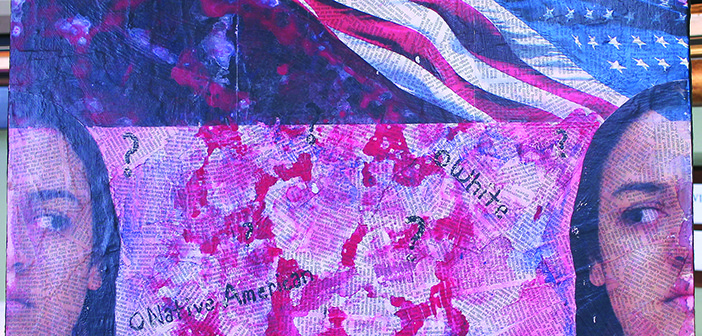By Sarah Colson
Politics. Class. Race. These are a few subjects that senior Zach Hollifield never gave much thought to before attending Milligan College.
Hollifield grew up in Johnson City, attended Science Hill High School, and went to church like many of his fellow Johnson Citians. To him, “reconciliation” was just a word – until he met friends whose lives had been touched by racism and class division.
“I was one of those people who, if it wasn’t for God working on my heart, would be saying, ‘there’s no problem, there’s no injustice,’” Hollifield said. “That’s really how I lived the majority of my life. It took God opening my eyes and bringing friendships into my life where I was able to listen to their story, about how they have lived life, about how they have experienced life very differently than I have.”
At Milligan this semester, faculty members, staff and students are examining some of those diverse experiences in the light of what they see as God’s call toward reconciliation. This semester’s chapel series, “Reconciliation,” dives head-first into those sometimes controversial topics in the hopes of shedding light on disunity and turning what could otherwise be unhelpful conversation into something unifying.
“It’s not hard to look around and see that our society is fractured,” Campus Minister Brad Wallace said. “There’s a call there for the church when you look at conversations people are having about politics, about class and about race. And the ways most of those conversations are unfolding are sometimes very hostile and antagonistic. People are condescending toward people with other viewpoints. As the church, we’re called to minister to our culture, but part of the way we do that is to learn to talk about issues ourselves and that in itself is a big step forward.”
As a culmination of that chapel theme, Milligan has deemed this week, “Reconciliation Week.” A free public art show, “Reconciled: New Creation, Lament and Hope,” is on display this week in the Gregory Center Lobby on campus. Presented by Milligan’s Office of Multicultural Engagement and the East Tennessee State University Slocumb Galleries Student Society, the show includes a reception from 5-7 p.m. tomorrow.
Hollifield said this week is helping him realize the importance of listening to all sides of a conversation. “I’ve realized whether I want it or not, I’m going to have white privilege so I can use my privilege to benefit those who don’t have it. I’m really thankful to Milligan, because they didn’t have to, but they were willing to start a conversation even when they knew it might not be the most popular thing to do.
“When you look at our country, there’s obvious tension surrounding a lot of things,” Hollifield said, “and one thing the tension seems to be hinging on is that there’s a group of people saying that there’s injustice happening and then there’s a group of people who say, ‘You’re making something out of nothing.’ There’s tension when one group is crying out for help and the other group says there’s not a problem.
“If in fact there is injustice happening, we need to listen to those people, but the only way that we’ll ever come to see what they’re seeing is by talking with them and having a conversation and that seems not to be happening around the country. Milligan is starting that conversation.”
“Reconciliation Week” started with Dr. Jeff Smith, director of Milligan’s Diversity Services and Multicultural Engagement. Smith emailed faculty and staff in August suggesting a week geared toward reconciliation in the Christian context. Students, who have been immersed in a chapel series on reconciliation, now will have the chance to give feedback and start the conversation on the theme.
“Here’s what I love and admire about Jeff and why it’s so good that we have him here doing his job, which is an incredibly hard job in his context,” Wallace said. “He’s leading the conversation about multicultural engagement and how we as an institution try to move forward in that. He brings all this intellectual and academic prowess but at the same time he’s all about the Kingdom.”
Wallace said that while the week is focused on some events that might draw controversy, the goal is ultimately to create a sense of peace, even among differing viewpoints.
“And that’s not the kind of artificial peace that comes through, ‘hey let’s all just get along and not talk about difficult things,’” Wallace said. “It’s peace you earn by wrestling through things and talking to people who are different than you and listening. For our context here, race is one of the primary contexts or places where some of these issues play out, but this series hasn’t been about race or racism or race relations; it’s a series about the kingdom of God.”
Wallace said he hopes to see these conversations about reconciliation turn into action.
“Reconciliation is much easier to talk about than it is to actually do,” he said. “When we think of reconciliation, usually we think, ‘let’s all get along,’ and tensions get eased and we all feel good and then we sort of move on with our lives. But the truth is, reconciliation is hard work and it takes things like courage and grace and an ability to listen to people coming from a different viewpoint. Even in our campus community, we have a wide diversity of people’s different backgrounds. There’s something about talking about those differences that is challenging; it’s hard work, it can be anxiety-provoking, but it’s spiritually-forming in a very real sense.
“People who say it’s too political or personal, sure, you run that risk. But Christian spirituality always lives in the real world and the real world is where issues are. If we don’t bridge that context, then we’re just kind of making ourselves feel good and it’s not really meaningful.”
To learn more about Milligan College or the specific events of “Reconciliation Week,” visit milligan.edu/2016/02/18/milligans-reconciliation-week-stresses-cultural-unification/.







